The United Nations Conference on Trade and Development (UNCTAD) predicted that GDP in the euro area would reach 4% growth in 2021.
As a base point, European countries experienced the largest contractions in production among developed economies in 2020.
The euro area’s GDP contracted 7.3% in 2020 as its largest economies locked in the first and second quarters, reopened in the third and returned to partial lockdowns in the fourth.
According to UNCTAD, the impact on livelihoods was very uneven.
For example, in the second quarter of 2020, wages fell 15% in Spain, 14% in Italy, 10% in France and 4.5% in Germany, compared to the same quarter of 2019.
Overall, the reality turned out slightly worse than UNCTAD’s forecast, mainly as a result of unanticipated second lockdowns that were not fully offset by private consumer spending.
France, Germany and Italy, the three largest economies in the bloc, saw their GDP rebound in the second half of the year, although Italy again posted negative growth in the fourth quarter.
These differences in economic performance were due to the uneven impacts of the pandemic, but also to weak fiscal responses.
European GDP
Compared to 2019, in 2020 public consumption spending increased in Germany and Italy, but fell in France.
In the European Union it increased on average 1 percent.
Also, in the second quarter of 2020, subsidies fell in France, increased 8% in Italy and more than 300% in Germany, compared to the same quarter of 2019.
In early 2021, according to UNCTAD, the European Union shows no signs of a strong recovery and may experience another quarter of negative growth with prospects for the rest of the year largely dependent on how fiscal responses and vaccination programs evolve.
At the moment, there is no timetable for universal access to vaccines. Meanwhile, the European Union‘s fiscal response, focused on the Multiannual Financial Framework, has not provided or planned the necessary support for investment and demand.
The centerpiece of the ‘next generation EU’, a package of spending measures, including goods and services of up to 390 billion euros over 6 years, represents approximately 0.5% per year of the bloc’s GDP, linking the recovery to inequality spending (and indebtedness) of member countries.
![]()

